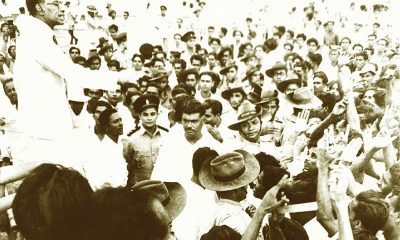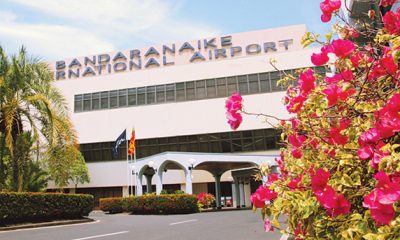Features
The Colombo Plan and entertaining on the Government account

SWRD stands the whiskies after his ‘saruwath’ party
(Excerpted from Memoirs of a Cabinet Secretary by BP Peiris)
I must refer here to what has come to be known as the Colombo Plan, of which much has been written. The matter was first raised by Mr J. R. Jayewardene who asked the Conference to consider the following resolution:
“To ensure a high and stable level of employment and to raise the standard of living of underdeveloped countries in South-East Asia, whether within the Commonwealth or outside it, it is necessary to develop their agricultural and industrial economies. This Conference, therefore, agrees to appoint a committee of officials of the countries concerned to obtain information and to prepare a 10-year plan for the development of these countries.
“The other members of the Commonwealth should consider means of providing such assistance as may be necessary for the implementation of this plan with money, guaranteed prices, technical skill and machinery. The plan should be examined by a committee of experts who, after visiting the countries concerned, should make recommendations with regard to the help which the Commonwealth countries can give in carrying out this programme.”
At a later meeting, Mr Spender informed the Conference that when the Australian Delegation had compared their paper with Mr Jayewardene ‘s resolution, they thought that the recommendations in both could be combined into a single whole and the two Delegations had produced, in consultation with the New Zealand Delegation, a fresh resolution. This is the resolution which put the Colombo Plan on its feet. On this plan, this country has received tremendous aid from several Commonwealth. countries, particularly Canada, Australia, New Zealand and the United Kingdom. Our officials have, with their natural lethargy, delayed or failed to take full advantage of this assistance.
On January 14, 1950, at the public sitting, the final one, which was held in the Senate Chamber (after a heated hoo-ha between me and Samarawickrama, Clerk to the Senate, “Where on earth have you heard of a Legislative Chamber being used for a public sitting like this? etc. etc.”) all the Heads of Delegations spoke.
Mr D.S. Senanayake thanked the delegates who had come to the Conference at great inconvenience to themselves. The final communique was read. The Rt Hon. Philip Noel Baker then moved that an additional paragraph as follows be added at the end of the Communique:
“At the conclusion of the final meeting of Ministers this morning, the representatives of all the other Commonwealth Governments expressed their appreciation of the helpful manner in which Mr Senanayake had presided over their meetings, and their gratitude for the generous hospitality accorded to them by the Government of Ceylon during their stay in the Island.”
He said: “Mr. Prime Minister, It has been said with great eloquence how much we all owe to you, to your Government and to your people. But I think it right that this should also be recorded in history in the communique which we issue this morning… I venture to think that these discussions have been of lasting and dynamic importance to our peoples and to the world, and not the least important of what has happened, if I may say so, has been your speech at the opening Conference and the speeches which have been made this morning. I beg to move, is it agreed, Gentlemen?” Cries of “Aye”.
Every day of the Conference, there was a cocktail party by a Minister for the delegates. This put the Secretariat to a great deal of inconvenience. We could not refuse to attend; we also had to complete our minutes. After a couple of drinks, Sir Norman and his assistants used to take a hurried departure to the office. We had to dress to attend these parties and then take our bow ties and collars off when we got back.
The last party was by Mr S.W.R.D. Bandaranaike, Minister of Local Government and Leader of the House of Representatives, who was not a member of the Ceylon Delegation. He therefore did not know the delegates and the delegates did not know him. His party was at the House of Representatives and he instructed the Police to send the delegates up the main steps facing the sea.
I was instructed by letter to come and assist him with the introductions. I took this as an order and attended in black trousers and a white jacket. S.W.R.D. was in what is known as the National Dress, that is, a cloth, a banian or something looking like a shirt above it and a scarf across his shoulders. I took my place next to him at the head of the steps. The first invitee was climbing up the steps and he asked me who he was. As there was a huge Grecian Pillar which obstructed my view, I took a couple of steps forward and said it was Sir Norman Brook, Secretary to the Cabinet.
Brook came to the top of the steps, recognized me, passed the host, and said “How do you do, Peiris”. I said “This is the Honorable the Minister” and he greeted the Minister with a “How do you do, Sir.” For what reason I did riot know, but mine host appeared to be a bit annoyed with me. The same thing happened with the second guest, Mr Lester Pearson from Canada, who greeted me first and had to be introduced by me to the Minister. S.W.R.D. was now really annoyed with me and snapped “Take two steps back” which I did, and I was again obstructed by the pillar.
“Who’s that?” he asked, as the third guest was climbing up and I said it was Doidge from New Zealand. To do this, I had to take two steps forward, look, and, in accordance with orders, take two steps back. “How do you do”, gleamed the Minister, and he was happy. After that, it worked with almost military precision with the host, on the one hand, greeting his guest by their surnames and I, on the other, doing a little goose-stepping by his side.
This was the last party in honour of the delegations. It was also the first and the only party at which no alcoholic drinks were served. Pink and green drinks were going round and Ernest Bevin insisted on a whisky-soda which had to be hurriedly obtained from the Refreshment Room. The party was from 7 to 8. 30 p.m. There is a limit to the number of glasses of hair-oil that a guest can drink, and by 8. p.m, every guest had gone.
It was the dullest party I had attended. I asked Ralph Deraniyagala, Clerk to the House, fora whisky, and while Ralph and I were having our drink in his room, S.W.R.D. came in and Ralph said to him “Solomon, B. P. said this was not his idea of a party and that he wouldn’t have come unless you had ordered him to do so. He wanted whisky, so I’ve ordered it on your account.”
“Quite right,” said S.W.R.D. “Put it on my chit and order another.”
A weekend intervened during the Conference and the delegates were taken on a sight-seeing tour, some to the ruined cities, some to Kandy, and the others to Nuwara Eliya. They traveled in Government cars, each party accompanied by a Government representative. I was asked to look after my colleague Bavin, who did not want to go to any of these places, but desired to sea bathe: l was an owner, driver and asked for a Government car as I was far too tired after the Conference work to drive a long distance.
I was told that no cars, were available and asked to use my own car and charge mileage. Bavin was to be treated as a State Guest and I was to charge all expenses to Government account. As I dislike talking while I am driving, and as I did not like to drive Bavin fifty miles out and back in silence, I asked my friend Alexis Roberts to join us and keep Bavin amused on the trip. Roberts was a great talker, well-informed and well-read. We drove to the Ambalangoda Resthouse where Bavin went twice into the sea, after which, he asked for a gin and I therefore ordered three.
In all, we had nine gins before lunch. I was careful to preserve the bills. On the way back, Bavin wanted to have another dip, and I turned into the Bentota Resthouse, where we had beer. At Panadura, I bought a bottle of whisky. We saw the elephants dance at the zoo. Finally, home to my place for – whisky and music, which my guest seemed to enjoy, provided it was not the pop variety.
Later in the evening, I dropped him back at his hotel. A few days after the departure of the delegates to their home countries, I sent to the Ministry of External Affairs, my claim for expenses incurred in taking Bavin out as a State Guest. Every item of claim was supported by what, in audit, is called a “Voucher”. My claim included traveling in a Peugeot car (weight and horse power specified) to Ambalangoda and back, nine gins, three ginger ales, three lunches, three pints of beer, three teas, one bottle whisky and three zoo tickets.
My claim was queried on two points by my good friend Jayamanne, Officer of Protocol: one, I was asked why a third man was taken and who he was; two, why was so much liquor consumed. On the first point, I replied I had asked for a Government car which had been refused, that as a careful driver, I watch the road when driving and was not in the habit of talking, that if I took a Government guest out, it was not the done thing to bore him, and that I therefore invited a friend of mine to join us and keep our guest entertained with his conversation at which he was very good.
On the second point, I said that Bavin had three gins after his two swims (for which no charge had been made) and that I thought courtesy demanded that we keep in step; similarly with the beer, and that, as he was a guest of the Government, it would have been an insult to him, as well as to the Government, if I had bought only a pint of whisky and then run short. I said I did not know Bavin’s capacity, but his lunchtime performance showed he was a good stayer.
I therefore bought a full bottle, but only quarter of it was consumed. I added that it would have been an unpardonable crime to have thrown the balance down the drain and an utter nuisance and a waste of public officers’ time to fill up innumerable forms to return it to the Government Stores. In the circumstances, I did the only sensible thing by finishing the bottle myself in small daily doses. My claim was paid in full.
Features
Rebuilding Sri Lanka: 78 Years of Independence and 78 Modules of Reform
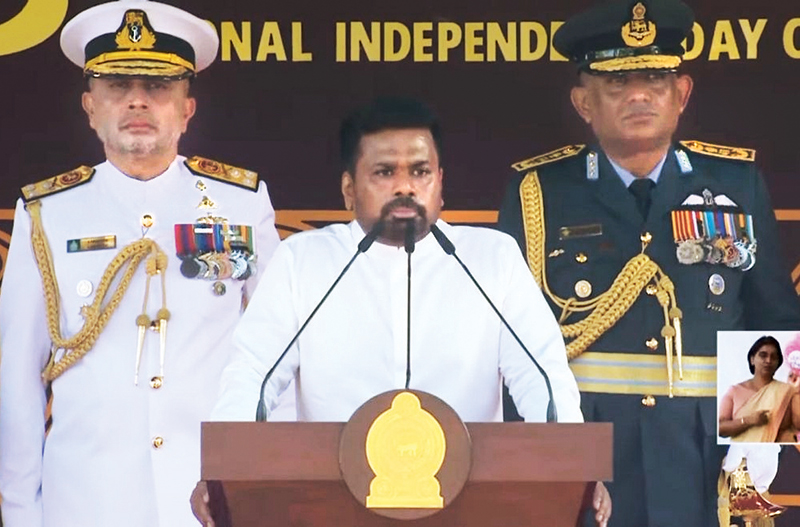
“The main theme of this year’s Independence Day is “Rebuilding Sri Lanka,” so spoke President Anura Kumara Dissanayaka as he ceremonially commemorated the island’s 78th independence anniversary. That was also President AKD’s second independence anniversary as President. Rebuilding implies that there was already something built. It is not that the NPP government is starting a new building on a vacant land, or whatever that was built earlier should all be destroyed and discarded.
Indeed, making a swift departure from NPP’s usual habit of denouncing Sri Lanka’s entire post independence history as useless, President AKD conceded that “over the 78 years since independence, we have experienced victories and defeats, successes and failures. We will not hesitate to discard what is harmful, nor will we fear embracing what is good. Therefore, I believe that the responsibility of rebuilding Sri Lanka upon the valuable foundations of the past lies with all of us.”
Within the main theme of rebuilding, the President touched on a number of sub-themes. First among them is the he development of the economy predicated on the country’s natural resources and its human resources. Crucial to economic development is the leveraging of our human resource to be internationally competitive, and to be one that prioritises “knowledge over ignorance, progress over outdated prejudices and unity over division.” Educational reform becomes key in this context and the President reiterated his and his government’s intention to “initiate the most transformative era in our education sector.”
He touched on his pet theme of fighting racism and extremism, and insisted that the government “will not allow division, racism, or extremism and that national unity will be established as the foremost strength in rebuilding Sri Lanka.” He laid emphasis on enabling equality before the law and ensuring the supremacy of the law, which are both necessary and remarkable given the skepticism that is still out there among pundits
Special mention was given to the Central Highlands that have become the site of repeated devastations caused by heavy rainfall, worse than poor drainage and inappropriate construction. Rebuilding in the wake of cyclone Ditwah takes a special meaning for physical development. Nowhere is this more critical than the hill slopes of the Central Highlands. The President touched on all the right buttons and called for environmentally sustainable construction to become “a central responsibility in the ‘Rebuilding Sri Lanka’ initiative.”. Recognizing “strong international cooperation is essential” for the rebuilding initiative, the President stated that his government’s goal is to “establish international relations that strengthen the security of our homeland, enhance the lives of our people and bring recognition to our country on a new level.”
The President also permitted himself some economic plaudits, listing his government’s achievements in 2025, its first year in office. To wit, “the lowest budget deficit since 1977, record-high government revenue after 2006, the largest current account balances in Sri Lanka’s history, the highest tax revenue collected by the Department of Inland Revenue and the sustained maintenance of bank interest rates at a long-term target, demonstrating remarkable economic stability.” He was also careful enough to note that “an economy’s success is not measured by data alone.”
Remember the old Brazilian quip that “the economy is doing well but not the people.” President AKD spoke to the importance of converting “the gains at the top levels of the economy … into improved living standards for every citizen,” and projected “the vision for a renewed Sri Lanka … where the benefits of economic growth flow to all people, creating a nation in which prosperity is shared equitably and inclusively.”
Rhetoric, Reform and Reality
For political rhetoric with more than a touch of authenticity, President AKD has no rival among the current political contenders and prospects. There were pundits and even academics who considered Mahinda Rajapaksa to be the first authentic leadership manifestation of Sinhala nationalism after independence, and that he was the first to repair the rupture between the Sri Lankan state and Sinhala nationalism that was apparently caused by JR Jayewardene and his agreement with India to end the constitutional crisis in Sri Lanka.
To be cynical, the NPP or AKD were not the first to claim that everything before them had been failures and betrayals. And it is not at all cynical to say that the 20-year Rajapaksa era was one in which the politics of Sinhala nationalism objectively served the interests of family bandyism, facilitated corruption, and enabled environmentally and economically unsustainable infrastructure development. The more positive question, however, is to ask the same pundits and academics – how they would view the political authenticity of the current President and the NPP government. Especially in terms of rejecting chauvinism and bigotry and rejuvenating national inclusiveness, eschewing corruption and enabling good governance, and ensuring environmental stewardship and not environmental slaughter.
The challenge to the NPP government is not about that it is different from and better than the Rajapaksa regime, or than any other government this century for that matter. The global, regional and local contexts are vastly different to make any meaningful comparison to the governments of the 20th century. Even the linkages to the JVP of the 1970s and 1980s are becoming tenuous if not increasingly irrelevant in the current context and circumstances. So, the NPP’s real challenge is not about demonstrating that it is something better than anything in the past, but to provide its own road map for governing, indicating milestones that are to be achieved and demonstrating the real steps of progress that the government is making towards each milestone.
There are plenty of critics and commentators who will not miss a beat in picking on the government. Yet there is no oppositional resonance to all the criticisms that are levelled against the government. The reason is not only the political inability of the opposition parties to take a position of advantage against the government on any issue where the government is seen to be vulnerable. The real reason could be that the criticisms against the government are not resonating with the people at large. The general attitude among the people is one of relief that this government is not as corrupt as any government could be and that it is not focused on helping family and friends as past governments have been doing.
While this is a good situation for any government to be in, there is also the risk of the NPP becoming too complacent for its good. The good old Mao’s Red Book quote that “complacency is the enemy of study,” could be extended to be read as the enemy of electoral success as well. In addition, political favouritism can be easily transitioned from the sphere of family and friends to the sphere of party cadres and members. The public will not notice the difference but will only lose its tolerance when stuff hits the fan and the smell becomes odious. It matters little whether the stuff and the smell emanate from family and friends, on the one hand, or party members on the other.
It is also important to keep the party bureaucracy and the government bureaucracy separate. Sri Lanka’s government bureaucracy is as old as modern Sri Lanka. No party bureaucracy can ever supplant it the way it is done in polities where one-party rule is the norm. A prudent approach in Sri Lanka would be for the party bureaucracy to keep its members in check and not let them throw their weight around in government offices. The government bureaucracy in Sri Lanka has many and severe problems but it is not totally dysfunctional as it often made out to be. Making government efficient is important but that should be achieved through internal processes and not by political party hacks.
Besides counterposing rhetoric and reality, the NPP government is also awash in a spate of reforms of its own making. The President spoke of economic reform, educational reform and sustainable development reform. There is also the elephant-in-the-room sized electricity reform. Independence day editorials have alluded to other reforms involving the constitution and the electoral processes. Even broad sociopolitical reforms are seen as needed to engender fundamental attitudinal changes among the people regarding involving both the lofty civic duties and responsibilities, as well as the day to day road habits and showing respect to women and children using public transport.
Education is fundamental to all of this, but I am not suggesting another new module or website linkages for that. Of course, the government has not created 78 reform modules as I say tongue-in-cheek in the title, but there are close to half of them, by my count, in the education reform proposals. The government has its work cut out in furthering its education reform proposals amidst all the criticisms ranged against them. In a different way, it has also to deal with trade union inertia that is stymieing reform efforts in the electricity sector. The government needs to demonstrate that it can not only answer its critics, but also keep its reform proposals positively moving ahead. After 78 years, it should not be too difficult to harness and harmonize – political rhetoric, reform proposals, and the realities of the people.
by Rajan Philips
Features
Our diplomatic missions success in bringing Ditwah relief while crocodiles gather in Colombo hotels

The Sunday newspapers are instructive: a lead story carries the excellent work of our Ambassador in Geneva raising humanitarian assistance for Sri Lanka in the aftermath of Ditwah. The release states that our Sri Lankan community has taken the lead in dispatching disaster relief items along with financial assistance to the Rebuilding Sri Lanka fund from individual donors as well as members of various community organizations.
The International Federation of Red Cross and Red Crescent Societies In Geneva had initially launched an appeal for Swiss francs CHF 5 million and the revised appeal has been tripled to CHF 14 million to provide life saving assistance and long term resilience building for nearly 600,000 of the most vulnerable individuals; the UN office for Coordination of Humanitarian Affairs has contributed US$4.5 million; the WHO has channeled US$175,000; In addition, our mission is working closely with other UN and International organizations in Geneva for technical support to improve disaster preparedness capacity in the long term in Sri Lanka such as through enhanced forecasting to mitigate risks and strengthen disaster preparedness capacities.
In stark contrast it is ironic to see in the same newspaper, a press release from a leading think tank in Colombo giving prominence to their hosting a seminar in a five star hotel to promote the extraction of Sri Lanka’s critical minerals to foreign companies under the guise of “international partners”. Those countries participating in this so called International Study Group are Australia, India, Japan and the US, all members of a regional defence pact that sees China as its main adversary. Is it wise for Sri Lanka to be drawn into such controversial regional arrangements?
This initiative is calling for exploitation of Sri Lanka’s graphite, mineral sands, apatite, quartiz, mica and rare earth elements and urging the Government to introduce investor friendly approval mechanisms to address licencing delays and establish speedy timelines. Why no mention here of the mandatory Environment Impact Assessment (EIA) or traditional public consultations even though such extraction will probably take place in areas like Mannar with its mainly vulnerable coastal areas? Is it not likely that such mining projects will renew commotion among poor mainly minority communities already badly affected by Ditwah?
It would be indeed pertinent to find out whether the think tank leading this initiative is doing so with its own funds or whether this initiative is being driven by foreign government funds spent on behalf of their multinational companies? Underlying this initiative is the misguided thinking defying all international scientific assessments and quoting President Trump that there is no global climate crisis and hence environmental safeguards need not be applied. Sri Lanka which has experienced both the tsunami and cyclone Ditwah is in the eye of the storm and has been long classified as one of the most vulnerable of islands likely to be effected in terms of natural disasters created by climate change.
Sri Lanka’s mining industry has so far been in local hands and therefore it has been done under some due process protecting both local workers involved in handling hazardous materials and with some revenue coming to the government. What is now being proposed for Sri Lanka is something in the same spirit as President Donald Trump visualized for redeveloping Gaza as a Riviera without taking into consultation the wishes of the people in that land and devoid of any consideration for local customs and traditions. Pity our beautiful land in the hands of these foreigners who only want to exploit our treasure for their own profit and leave behind a desolate landscape with desperate people.
by Dr Sarala Fernando
Features
The Architect of Minds – An Exclusive Interview with Professor Elsie Kothelawala on the Legacy of Professor J. E. Jayasuriya
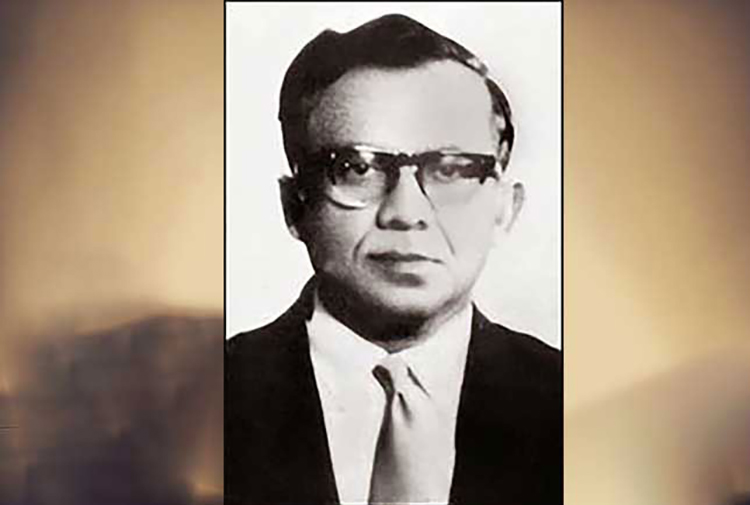
This year marks a significant milestone as we commemorate the 35th death anniversary of a titan in the field of education, Professor J. E. Jayasuriya. While his name is etched onto the covers of countless textbooks and cited in every major policy document in Sri Lanka, the man behind the name remains a mystery to many. To honour his legacy, we are joined today for a special commemorative interview. This is a slightly expanded version of the interview with Professor Elsie Kothelawala. As a former student who rose to become a close professional colleague, she offers a rare, personal glimpse into his life during his most influential years at the University of Peradeniya.
Dr. S. N. Jayasinghe – Professor Kothelawala, to begin our tribute, could you tell us about the early years of Professor J. E. Jayasuriya? Where did his journey start?
Prof. Elsie Kothelawala – He was born on February 14, 1918, in Ahangama. His primary education actually began at Nawalapitiya Anuruddha Vidyalaya. He then moved to Dharmasoka College in Ambalangoda and eventually transitioned to Wesley College in Colombo. He was a brilliant student, in 1933, he came third in the British Empire at the Cambridge Senior Examination. This earned him a scholarship to University College, Colombo, where he graduated in 1939 with a First-Class degree in Mathematics.
Q: – His professional rise was meteoric. Could you trace his work life from school leadership into high academia?
A: – It was a blend of school leadership and pioneering academia. At just 22, he was the first principal of Dharmapala Vidyalaya, Pannipitiya. He later served as Deputy Principal of Sri Sumangala College, Panadura.
A turning point came when Dr. C.W.W. Kannangara invited him to lead the new central school in the Minister’s own electorate, Matugama Central College. Later, he served as Principal of Wadduwa Central College. In 1947, he traveled to London for advanced studies at the Institute of Education, University of London. There, he earned a Post Graduate Diploma in Education and a Master of Arts in Education. Upon returning, he became a lecturer in mathematics at the Government Teachers’ Training College in Maharagama. He joined the University of Ceylon’s Faculty of Education as a lecturer in 1952 and later, in 1957, he advanced to the role of Professor of Education. Professor J. E. Jayasuriya was the first Sri Lankan to hold the position of Professor of Education and lead the Department of Education at the University of Ceylon.
The commencement of this department was a result of a proposal from the Special Committee of Education in 1943, commonly known as the Kannangara Committee.
Q: – We know he left the university in 1971. Can you tell us about his work for the United Nations and UNESCO?
A: – That was a massive chapter in his life. After retiring from Peradeniya, he went global. He moved to Bangkok to serve as the Regional Advisor on Population Education for UNESCO. He spent five years traveling across Asia, to countries like Pakistan, the Philippines, Indonesia, and Malaysia, helping them build their educational frameworks from the ground up.
Even after that, his relationship with the United Nations continued. He returned to Sri Lanka and served as a United Nations Advisor to the Ministry of Education for two years. He was essentially a global consultant, bringing the lessons he learned in Sri Lanka to the rest of the world.
Q: – How did you personally come to know him, and what was the nature of your professional relationship?
A: – I first encountered him at Peradeniya during my Diploma in Education and later my MA. He personally taught me Psychology, and I completed my postgraduate studies under his direct supervision. He was notoriously strict, but it was a strictness born out of respect for the subject. The tutorials were the highlight. Every day, he would select one student’s answer and read it to the class. It kept us on our toes! He relied heavily on references, and his guidance was always “on point.” After my MA, he encouraged me to apply for a vacancy in the department. Even as a lecturer, he supervised me, I had to show him my lecture notes before entering a hall.
Q: – He sounds quite imposing! Was there any room for humor in his classroom?
A: – He had a very sharp, dry wit. Back then, there was a fashion where ladies pinned their hair in high, elaborate piles. He once remarked, “Where there is nothing inside, they will pile it all up on the outside.” Needless to say, that hairstyle was never seen in his class again!
Q: – Looking at the 1960s and 70s, what reforms did he promote that were considered innovative for that time?
A: – As Chairman of the National Education Commission (1961), he was a visionary. He promoted the Neighborhood School Concept to end the scramble for prestige schools. He also proposed a Unified National System of education and argued for a flexible school calendar. He believed holidays should vary by region, matching agricultural harvest cycles so rural children wouldn’t have to miss school.
Q: – One of his major contributions was in “Intelligence Testing.” How did he change that field?
A: – He felt Western IQ tests were culturally biased. He developed the National Education Society Intelligence Test, the first standardized test in national languages, and adapted the Raven’s Non-Verbal Test for Sri Lankan children. He wanted to measure raw potential fairly, regardless of a child’s social or linguistic background.
Q: – How would you describe his specific contribution to the transition to national languages in schools?
A: – He didn’t just support the change, he made it possible. When English was replaced as the medium of instruction, there was a desperate lack of materials. He authored 12 simplified Mathematics textbooks in Sinhala, including the Veeja Ganithaya (Algebra) and Seegra Jyamithiya (Geometry) series. He ensured that “language” would no longer be a barrier to “logic.”
Q: – After his work with the UN and UNESCO, why did he become known as the “Father of Population Education”?
A: – While in Bangkok, he developed the conceptual framework for Population Education for the entire Asian region. He helped dozens of countries integrate population dynamics into their school curricula. He saw that education wasn’t just about reading and writing, it was about understanding the social and demographic realities of one’s country.
Q: – Madam, can you recall how Professor Jayasuriya’s legacy was honoured?
A: – Professor Jayasuriya was truly a unique personality. He was actually one of the first Asians to be elected as a Chartered Psychologist in the U.K., and his lectures on educational psychology and statistics were incredibly popular. During his time at the University of Ceylon, he held significant leadership roles, serving as the Dean of the Faculty of Arts and even as acting Vice Chancellor. His impact was so profound that the Professor J. E. Jayasuriya Memorial Lecture Theatre at the Faculty of Education in Peradeniya was named in his honor.
Beyond his institutional roles, he received immense recognition for his service, including honorary D. Lit and D. Sc degrees from the University of Colombo and the Open University, respectively. Perhaps his most global contribution was his ‘quality of life’ approach to population education developed for UNESCO in the mid-1970s. As O. J. Sikes of UNFPA noted in the International Encyclopedia on Education, it became the predominant teaching method across Asia and is still considered the fastest-growing approach to the subject worldwide.
Q: – Finally, what is the most profound message from his life that today’s educators and policymakers should carry forward?
A: – The lesson is intellectual integrity. When the government’s 1964 White Paper distorted his 1961 recommendations for political gain, he didn’t stay silent, he wrote Some Issues in Ceylon Education to set the record straight.
He believed education was a birthright, not a competitive filter. Today’s policymakers must learn that education policy should be driven by pedagogical evidence, not political expediency. As our conversation came to a close, Professor Elsie Kothelawala sat back, a reflective smile on her face. It became clear that while Professor J. E. Jayasuriya was a man of rigid logic, and uncompromising discipline, his ultimate goal was deeply human, the upliftment of every Sri Lankan child.
Thirty-five years after his passing, his presence is still felt, not just in the archives of UNESCO or the halls of Peradeniya, but in the very structure of our classrooms. He was a pioneer who taught us that education is the most powerful tool for social mobility, provided it is handled with honesty. As we commemorate this 35th memorial, perhaps the best way to honor his legacy is not just by remembering his name, but by reclaiming his courage, the courage to put the needs of the student above the convenience of the system.
Professor Jayasuriya’s life reminds us that a true educator’s work is never finished, it lives on in the teachers he trained, the policies he shaped, and the national intellect he helped ignite.
by the Secretary J.E.Jayasuriya Memorial Foundation : Dr S.N Jayasinghe
-

 Business1 day ago
Business1 day agoZone24x7 enters 2026 with strong momentum, reinforcing its role as an enterprise AI and automation partner
-

 Business5 days ago
Business5 days agoSLIM-Kantar People’s Awards 2026 to recognise Sri Lanka’s most trusted brands and personalities
-

 Business6 days ago
Business6 days agoAll set for Global Synergy Awards 2026 at Waters Edge
-

 Business1 day ago
Business1 day agoHNB recognized among Top 10 Best Employers of 2025 at the EFC National Best Employer Awards
-
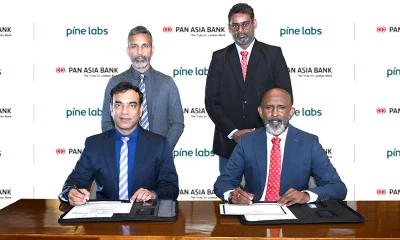
 Business5 days ago
Business5 days agoAPI-first card issuing and processing platform for Pan Asia Bank
-

 Editorial3 days ago
Editorial3 days agoAll’s not well that ends well?
-

 Business1 day ago
Business1 day agoGREAT 2025–2030: Sri Lanka’s Green ambition meets a grid reality check
-

 Features3 days ago
Features3 days agoPhew! The heat …


